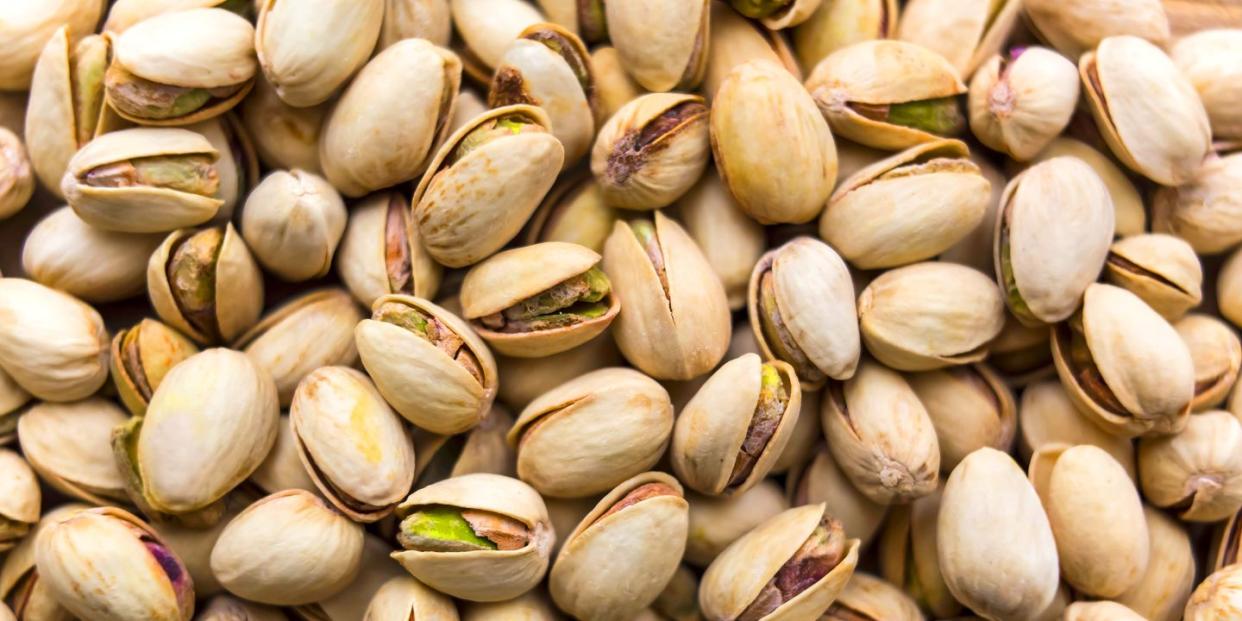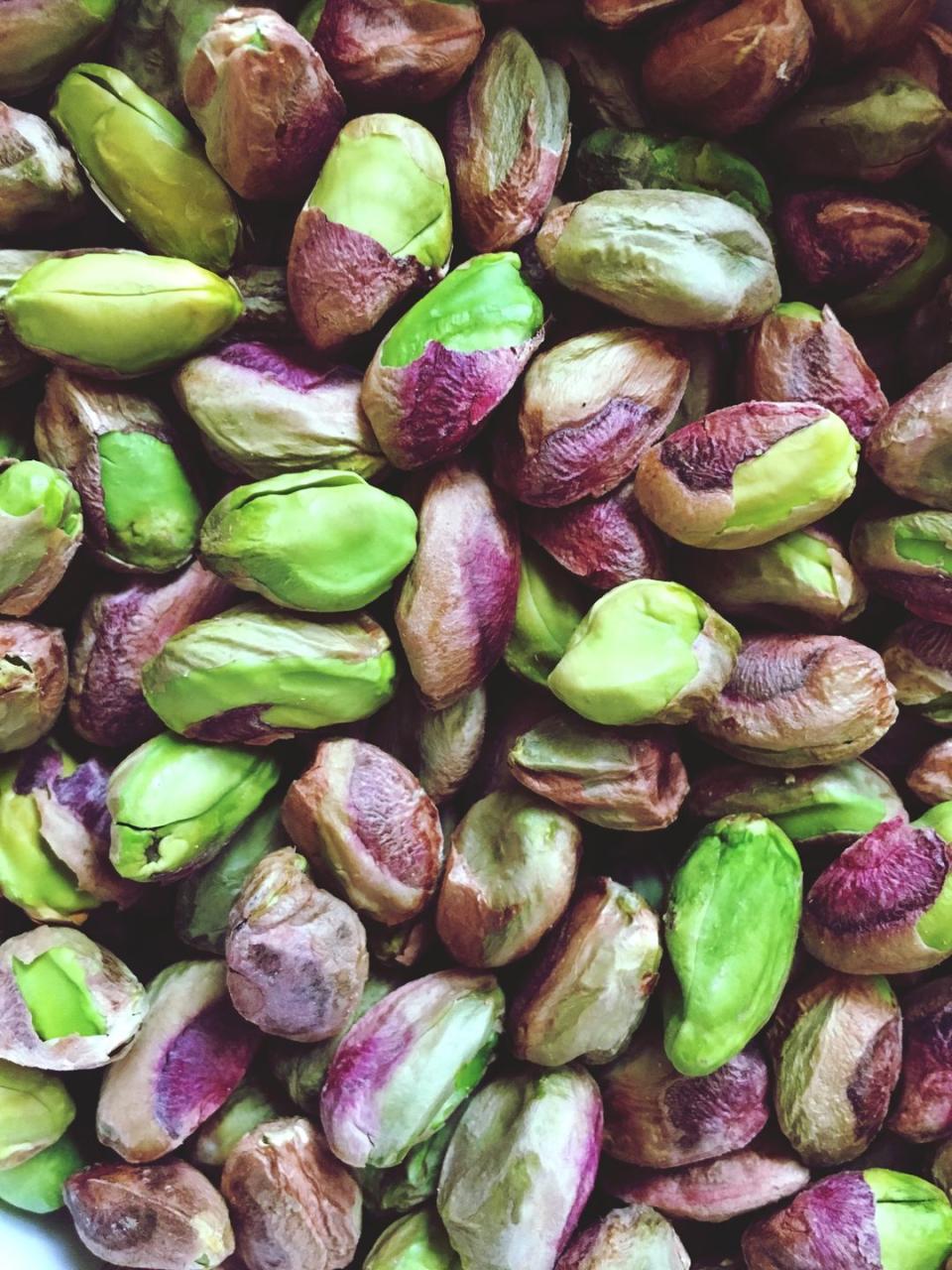Pistachios Have More Antioxidants Than Any Other Nut

When you want something healthy, crunchy, and easy to nosh on-the-go, nuts of all kinds—almonds, peanuts, pistachios, cashews—are an easy go-to. And, given that nuts are good sources of fat, fiber, and protein—along with a slew of different vitamins and minerals—you can feel pretty darn good about your choice.
Not to mention, research suggests that eating nuts can help protect you from cardiovascular issues like heart disease and high blood pressure, along with type 2 diabetes. They may even help you maintain a healthy weight.
Some nuts have more of a health halo than others, though. Almonds, in particular, pretty much dominate the nut aisle these days. (And the dairy aisle, thanks to all the almond-based milk and yogurt alternatives out there these days.) Peanuts—which are technically legumes, BTW—meanwhile, get the side-eye from many healthy eaters.
What about often-forgotten pistachios, though?
Though they might not be as trendy as almond-everything, pistachios are actually really darn good for you. “Pistachios have a lot going for them health-wise,” says Kim Larson, RD, nutrition and health coach at Seattle's Total Health. Not to mention, they're just straight-up delicious.
Before you pass over bright green pistachios the next time you're in the bulk aisle, keep the following impressive health benefits in mind.

Let's talk about pistachios' nutrition information.
When you want to stock up on pistachios, you've typically got two different options: shelled or unshelled.
Here's the nutrition info for an ounce of shelled pistachios (about 49 kernels), per the USDA Nutrition Database:
Calories: 159
Fat: 12.8 grams
Protein: 5.72 grams
Carbs: 7.7 grams
Fiber: 3 grams
Sugars: 2 grams
And the nutrition info for an ounce of pistachios still in their shells, per the USDA Nutrition Database:
Calories: 85
Fat: 7 grams
Protein: 3 grams
Carbs: 4 grams
Fiber: 1.5 grams
Sugars: 1 gram
According to dietitian and spokeswoman for the Academy of Nutrition and Dietetics Sonya Angelone, RD, pistachios are a good source of fiber, protein, the minerals magnesium and copper, vitamin E, folate, and natural cholesterol-lowering compounds called plant sterols. “They’re also a good source of healthy monounsaturated fats,” she adds.
Yep, pistachios offer some pretty legit health benefits.
Pull up a chair, take a seat, and prepare to be floored. Pistachios are seriously good for you. Here are six noteworthy benefits.
1. They’re a solid source of fiber.
Fiber is important for a slew of different aspects of your health, like keeping your GI tract working properly and helping you maintain a healthy weight. And, oh hey—pistachios provide plenty of it. Since fiber enhances satiety, pistachios can ultimately help with weight control, if eaten in the appropriate amounts, Larson says.
2. Pistachios are lower in calories than most nuts.
Since many nuts contain serious calories, this is kind of a BFD. While pistachios contain 159 calories per ounce on paper, recent research by the Agricultural Research Service suggests they might actually contain five percent fewer calories that we thought.
3. They’re packed with antioxidants.
“Because of their unique purple and green color, pistachios may have more antioxidants and anti-inflammatory effects than other nuts,” says Angelone.
Those colors are caused by nutrients lutein (which is related to beta-carotene and vitamin A) and anthocyanin. “Most other nuts lack anthocyanin,” says dietitian Julie Upton, MS, RD, co-founder of nutrition website Appetite for Health.
4. Pistachios may help you sleep better.
Surprising fun fact about pistachios: They contain melatonin, a hormone that regulates the sleep-wake cycle. In fact, according to Angelone, they are the most melatonin-rich nut in the game. “Eating a handful of pistachios is like taking a melatonin supplement,” she says. Apparently some people even snack on pistachios to help with jet lag.
5. They aren't as easy to overeat as other nuts.
Compared to other nuts, pistachios have a nice balance of protein and fat, which can help fill you up and keep you satiated, Upton says. Plus, eating them in-shell also helps prevent overeating. “I like that they come in the shell, which helps slow you down,” Larson says. Basically, with all the time you spend cracking pistachio shells to get to the nuts, you’ give yourself a beat to feel full before you've gone too far.
6. Pistachios' healthy fats support long-term health.
Thanks to their healthy fats (mostly monounsaturated and polyunsaturated), eating pistachios can do your health a solid in the long run. Experts believe these fats can help lower your LDL (a.k.a. bad) cholesterol, reducing your risk of heart attack and stroke in the process. They also and help develop and maintain your cells. Plus, polyunsaturated fats also contain essential fatty acids that your body needs for brain function. “Eating them may help slow age-related cognitive decline,” suggests Larson.

I'm sold. So what’s the healthiest way to enjoy pistachios?
There are so many different ways to get your pistachio fix. For starters, you can always just sit down with a handful.
If you want to get a little more creative, though, Upton recommends crushing up a bunch of pistachios and using them as a crust for meat instead of traditional breading. They also make a great addition to pretty much any healthy cookie recipe you'd usually add nuts to.
Pistachios are also a great way to make homemade trail mix and muesli feel fancy, Larson says. Plus, they add a nice crunch (and protein!) to vegetarian dishes and salads.
You Might Also Like
